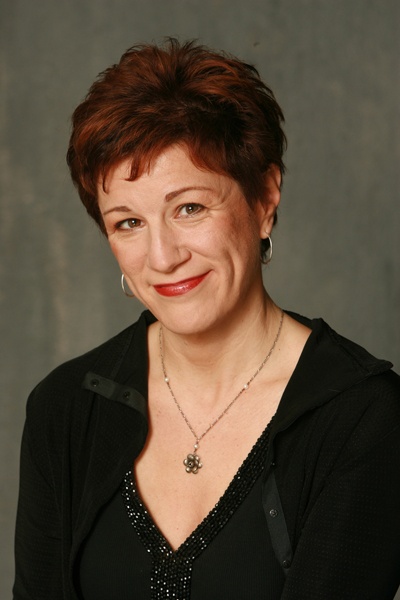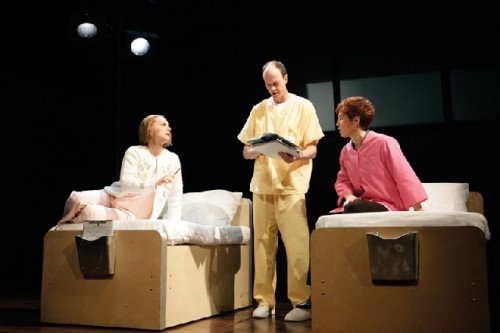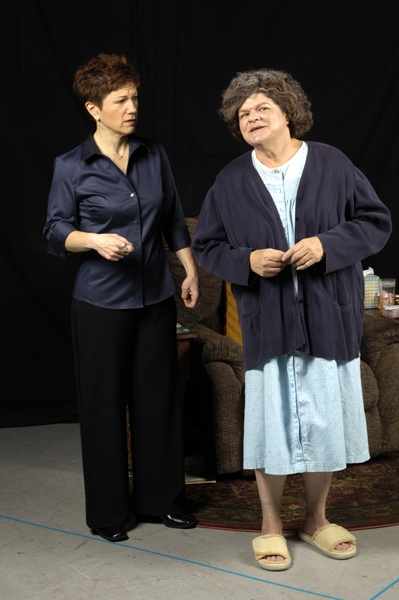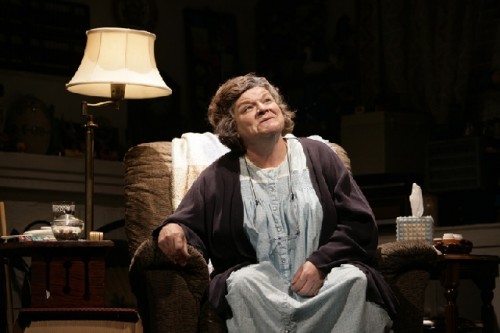Lisa Kron's Well at Huntington Theatre Company
All's Not Quite Well but Ends Well, Kindah
By: Charles Giuliano - Mar 15, 2007
Well written by and starring Lisa Kron. Directed by Leigh Silverman, Scenic Design, Tony Walton, Costume Design, Miranda Hoffman, Lighting Design, Christopher Akerlind, Original Music and Sound, John Gromada, Casting Director, Alaine Alldaffer, Production Stage Manager, Stephen M. Kaus, Stage Manager, Ellen Ryan Kelly. The Cast: Lisa, Lisa Kron, Ann, Mary Pat Gleason, Howard and others, Jack McAdams, Jim and others, Colman Domingo, Kay and others, Donetta Lavinia Grays, Joy and others, Barbara Pitts. The Huntington Theatre Company, 264 Huntington Avenue, Boston, Ma. 02115. http://www.huntingtontheatre.org Box office: 617 266 0800 From March 9 through April 8, 2007.
When Lisa, as herself, comic and playwright, Lisa Kron, starts to talk with us, the audience, she attempts to establish some overview and ground rules for the evening of theatre. What it will and will not include and what it is and isn't about. Quite emphatically she states, with broadly comic gesture, "This is not about my mother." Who happens to be largely present as wonderfully and warmly played by the enormous, in every sense, Mary Pat Gleason as Ann Kron.
The edgy, avant-garde notion of Kron, as she labors all evening to demonstrate, justify and explain is that this is and isn't a play. We are informed that she has evolved from stand up comic to expand into something grander and more ambitious, like a play, drama/ comedy, theatre and all that. Which might have been better and made more sense, as she informs us, if "I had attended grad school." Which provoked a good natured laugh from the audience. That is a bit coy as the real life Kron Teaches Grad Students, at Yale, no less. Playwriting actually. Were I the professor I would give her a B plus and suggest another draft. But perhaps I am harsh as the play comes to the Huntington from Broadway, where it was a great success, having gotten there after being well received off Broadway. While that may convey the provenance of a successful production it may also be a comment on the state of theatre nowadays.
This was a play/ standup/ documentary whatever that one truly wanted to like or at least enjoy. Surely we can all use a good laugh now and then. But, unlike a shrill neighbor, who cackled in my ear with hysteria at virtually every possible opportunity, early on I knew I was in for a long evening, I found this more amusing, even sad and poignant than, well, funny. As in ha ha funny. Except, of course, for any scenes or lines involving Gleason, who was hilarious. She was the true glue of a somewhat disjointed effort.
Her presence on stage started even before the first lines of the play. The audience arrives to find her slumbering in an enormous stuffed recliner in her living room of cluttered but neatly organized kitsch. When she is awaked by Lisa she is shocked to discover us. "Did you pay to get in here" she asks us. Then, as a true Mom, she asks if we would like some drinks. Toddling off she returns with a bag of snacks that she begins to toss into the audience. This back and forth between a play and reality weaves through the evening when Ann (Mom) wonders why she is in her daughter's play, even though she supports her activity and ambition.
So this is a play, not, which is not, is, about the author's, more or less, mother, or not. Kindah. From time to time Kron takes out a stack of index cards to read to us the intentionality of her experimental theatrical trope. She lapses into the play, directing the actors, who she refers to as just that, actors, and then jumps into a spotlight that disrupts the play and allows her the trope of standup/ monologue. But Mom, as Moms tend to do, cuts through that pretentious structure with ad lib comments. At one point Kron challenges her and tells her to back off, stop interrupting the monologue, and how can she hear her as she stands in the spotlight as Mom is still embedded in the play? Nonsense, is Mom's earthy reply, which is just how parents respond to the conceits of their children. "Of course I can hear you" she says. "You're standing in a spotlight for heaven's sake not an isolation booth."
The primary issue for Kron is illness; Mom's twenty year long incapacitation. She is described roughly as a ball of energy contained in a lethargic body. But also an activist and pioneer with unique ideas of social interaction and integration at a time when that was unusual. Lisa informs us that she could cure a community but not herself. There is a back story with a racially mixed cast that explores the ups and downs of that attempt at integration. And that, during college, Lisa became ill, to what extent as a response to the chronic condition of her mother, and had a horrific stretch in an allergy clinic that commenced with a six day fast and evacuation, followed by enemas and a systematic introduction to various foods and chemicals to isolate the cause of symptoms. The same small cast that performed as members of the community double as hospital staff and patient/ roommates. Much of this is rather unfunny and often played over the top.
There are also some confusing mechanics in the minimalist set by Tony Walton. As is the current fashion we are allowed to see the rows of lights above the set which feature's Mom's living room on the right, a center "platform" for Kron's "standup monologues" and a generic blank area on the left with varying backdrops and props. It all creates a sense of mumbo jumbo complemented by numerous costume changes (by Miranda Hoffman) to signify the different characters. Toward the end of the evening a nasty little black girl, the childhood terror and nemesis of Kron, pulls a switch that tumbles down the scrims of the set. Thereby ending the illusion and creating yet another reality. A little deconstruction or just plain destruction? All of these metaphors visual and textual got a bit awkward. It wasn't just Kron who needed those index cards to keep track of the action. There was a lapse recalling the Abbott and Costello routine of "Who's on First?"
While the "play" is well intended there is something inherently unfunny about a woman's struggles with her mother and their battles with illness, or its opposite "wellness," Mom's and her own. Perhaps this would "play" better as straight up drama. This seems to be the generic issue and conundrum when illness is played for laughs from "One Flew over the Cuckoo's Nest" to the "Madness of King George 111."
The performance style of Kron very much recalls that of Ellen Degeneris but while similar in form is less zingy and brilliant. There is the same upbeat lesbian persona: Another lady in tuxedo pants, tailored shirt, and short hair who is warmly engaging in a serio/ comic manner. While there are points for wit and style the performance gets over stretched when it reaches for laughs. Maybe Kron is just trying too hard to be the hip, successful daughter, while Mom is hilarious by just being Mom. She reminded me a lot of my Mom and her manner of skewering my artistic ambitions. In that sense Kron's Mom reminds us of everyone's Mom and that is indeed what was most successful and enduring about this experience.






